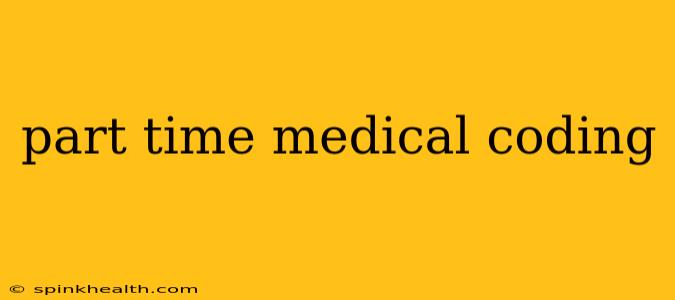The hum of the computer, the satisfying click of the keyboard, the quiet satisfaction of transforming medical jargon into clear, concise codes – this is the world of medical coding. And guess what? You don't need to dedicate your entire life to it. A part-time medical coding career offers flexibility, excellent earning potential, and the chance to make a real difference in the healthcare industry. This guide unravels the mysteries of part-time medical coding, answering your burning questions and helping you navigate this exciting field.
Is Part-Time Medical Coding a Viable Career Path?
Absolutely! The demand for skilled medical coders is consistently high, creating numerous opportunities for both full-time and part-time positions. Healthcare facilities, insurance companies, and medical billing companies all rely on accurate coding for smooth operations and efficient reimbursement. This means a part-time role can be just as valuable and rewarding as a full-time one, offering a flexible schedule that adapts to your lifestyle. Whether you're a parent balancing family responsibilities, a student supplementing your education, or simply seeking a fulfilling career alongside other pursuits, part-time medical coding provides a viable and financially rewarding path.
What are the typical job duties of a part-time medical coder?
A part-time medical coder's duties mirror those of a full-time coder, just scaled down to suit the reduced hours. This typically involves:
- Reviewing patient medical records: This includes charts, lab results, and physician notes to accurately capture the details of diagnoses, procedures, and treatments.
- Assigning appropriate ICD and CPT codes: Using established coding guidelines, you'll translate medical information into standardized alphanumeric codes that insurance companies understand.
- Ensuring coding accuracy and compliance: Adherence to regulations and guidelines is crucial for accurate billing and to avoid penalties. This requires attention to detail and a strong understanding of medical terminology and coding principles.
- Maintaining accurate coding documentation: Keeping detailed records of your work is crucial for auditing purposes and to demonstrate compliance.
What qualifications do I need for a part-time medical coding job?
While specific requirements vary, most employers look for a combination of education and experience:
- Formal education: A certificate or associate's degree in medical coding is often preferred. Many reputable online and in-person programs offer flexible scheduling to fit around a part-time career.
- Certified Coding Specialist (CCS) or Certified Professional Coder (CPC) certification: These credentials demonstrate proficiency and increase your marketability. While not always mandatory for entry-level positions, they significantly boost your prospects.
- Experience (often preferred but not always required): Prior experience in a healthcare setting or with medical billing can be advantageous, but many entry-level positions are available for qualified candidates.
- Strong computer skills: Proficiency in medical coding software and electronic health records (EHR) systems is essential.
How much can I earn as a part-time medical coder?
Earnings vary depending on experience, location, employer, and the number of hours worked. However, part-time medical coders can still earn a respectable income, often surpassing minimum wage considerably. The hourly rate is generally competitive, and the flexibility allows you to tailor your work schedule to maximize your earnings based on your availability.
How can I find part-time medical coding jobs?
Finding part-time medical coding opportunities involves a multi-pronged approach:
- Online job boards: Sites like Indeed, Monster, and LinkedIn are excellent resources for locating relevant positions.
- Healthcare staffing agencies: These agencies specialize in placing medical professionals and can often provide access to part-time opportunities.
- Directly contacting healthcare facilities and billing companies: Reaching out directly can often yield hidden opportunities not advertised elsewhere.
- Networking: Attend industry events or connect with professionals on LinkedIn to expand your network and learn about potential openings.
Can I work from home as a part-time medical coder?
Yes! Many part-time medical coding positions are remote, offering the ultimate flexibility. This allows you to work from anywhere with a stable internet connection, making it an ideal option for those seeking work-life balance.
Embarking on a part-time medical coding journey offers a unique blend of flexibility and professional fulfillment. It's a field ripe with opportunity, rewarding those with a keen eye for detail and a passion for healthcare. With dedication and the right training, your part-time coding career can become a cornerstone of a balanced and rewarding life.

